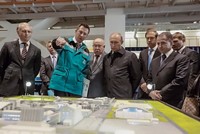Advertisement
Grab your lab coat. Let's get started
Welcome!
Welcome!
Create an account below to get 6 C&EN articles per month, receive newsletters and more - all free.
It seems this is your first time logging in online. Please enter the following information to continue.
As an ACS member you automatically get access to this site. All we need is few more details to create your reading experience.
Not you? Sign in with a different account.
Not you? Sign in with a different account.
ERROR 1
ERROR 1
ERROR 2
ERROR 2
ERROR 2
ERROR 2
ERROR 2
Password and Confirm password must match.
If you have an ACS member number, please enter it here so we can link this account to your membership. (optional)
ERROR 2
ACS values your privacy. By submitting your information, you are gaining access to C&EN and subscribing to our weekly newsletter. We use the information you provide to make your reading experience better, and we will never sell your data to third party members.
Finance
War to hit the chemical industry
European firms are bracing for sanctions and higher raw material prices
by Alex Scott , Alexander H. Tullo
March 3, 2022
| A version of this story appeared in
Volume 100, Issue 9
Russia’s invasion of Ukraine marks the first time in three-quarters of a century that the chemical industry has been seriously affected by a ground war in Europe. Companies, especially those trading with or operating in Russia, are bracing for the economic impact.
After the invasion, governments quickly imposed economic sanctions on Russia. Germany, for instance, halted certification of Nord Stream 2, a pipeline under the Baltic Sea meant to carry natural gas from Russia to Germany. But most of the sanctions imposed by the US and European Union are aimed at isolating Russia’s central bank and other financial institutions and at hampering the ability of Russian firms to do business abroad.
Russia’s chemical industry by the numbers
▸ $44 billion in chemical sales
▸ 1.1% of global chemical production in 2020
▸ $10 billion in imports from Europe, making it the 6th-largest importer from the European Union.
▸ $6.5 billion in exports to Europe, making it the 7th-largest exporter to the EU.
Source: European Chemical Industry Council. All numbers are for 2020.
Beyond the official measures, companies have been acting on their own. Oil and gas firms including BP, ExxonMobil, and Shell pledged to discontinue or sell their operations in Russia.
Analysts say they expect the situation for European chemical makers—for which Russia generates about 1% of sales—to be less politically sensitive than for oil companies. “Most European companies will probably not withdraw entirely from the Russian market,” says Sebastian Bray, a chemical analyst at Berenberg Bank.
Most chemical makers contacted by C&EN say they have yet to decide which actions they might take. One company making a move is Finland-based Kemira, which announced March 1 that it has ceased deliveries of chemicals—most of which are for pulp and paper processing—to Russia and Belarus.
Some chemical companies are highly exposed to Russia. BASF owns 67% of Wintershall Dea, an oil and gas producer that’s active there and that has a stake in Nord Stream 2. “This hurts,” says Sibylle Bischofberger, senior chemical analyst at Bank Vontobel. BASF also has 12 chemical production sites in Russia, where it employs around 700 people. The German firm is offering no information on its plans for those operations.
The German chemical industry has close ties to Russia. Some 2.4% of Germany’s chemical exports, worth about $6 billion, went to Russia in 2021, according to VCI, a German industry association. Some 25 German chemical companies have Russian subsidiaries, which together employ about 6,000 people, VCI says.
One German company, Wacker Chemie, says it expects the war to have limited direct impact. The firm’s sales in Eastern Europe, including Russia, are well below 10% of its total.
The Belgian firm Solvay is a partner with the Russian petrochemical maker Sibur in the RusVinyl joint venture. The $1.6 billion polyvinyl chloride complex opened in Kstovo, Russia, in 2014, in a ceremony attended by President Vladimir Putin. “At this stage, we are evaluating different options,” a Solvay spokesman says in an email.
Like other industry watchers, Wolfgang Große Entrup, the managing director of VCI, expects Russia’s invasion of Ukraine to push up the cost of making petrochemicals, particularly if Russian exports of oil and gas are restricted as part of sanctions imposed by the international community. “Chemical companies are threatened in this case with exploding prices for natural gas at an already historically extremely high price level,” Große Entrup says in an email.



Join the conversation
Contact the reporter
Submit a Letter to the Editor for publication
Engage with us on Twitter